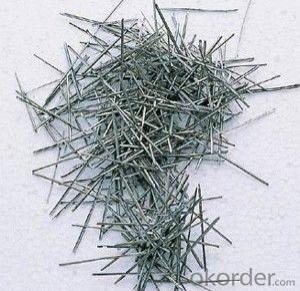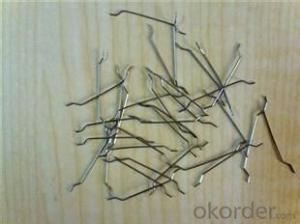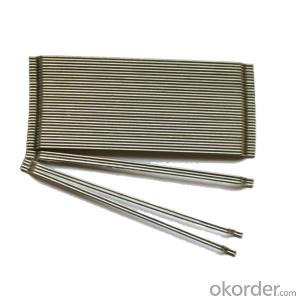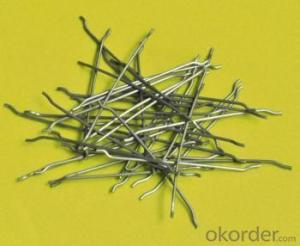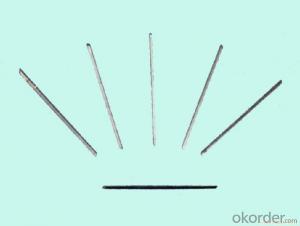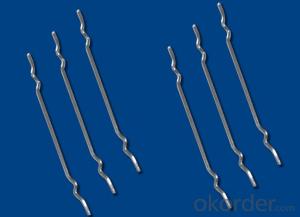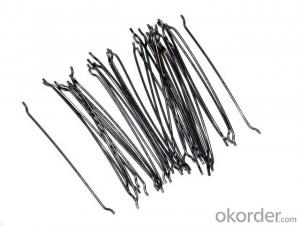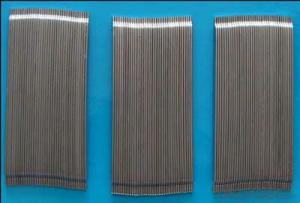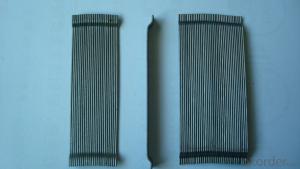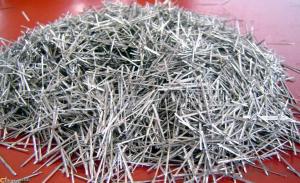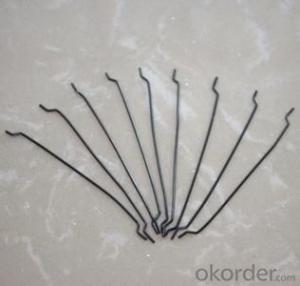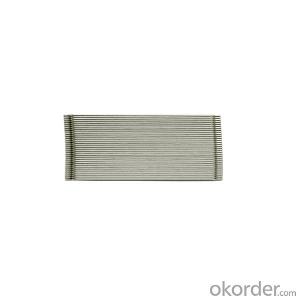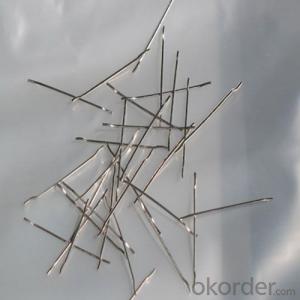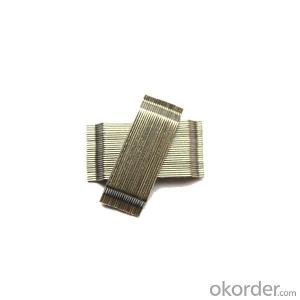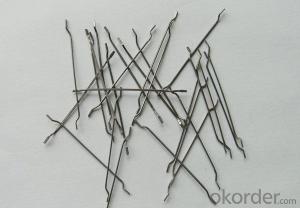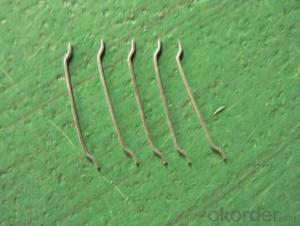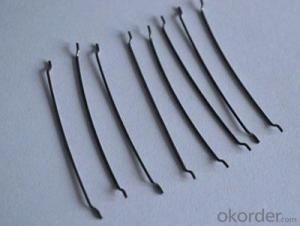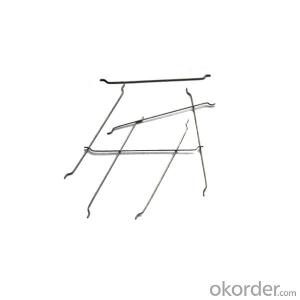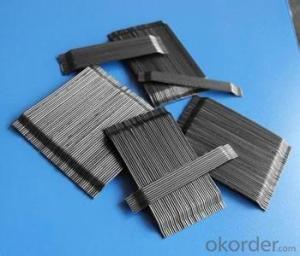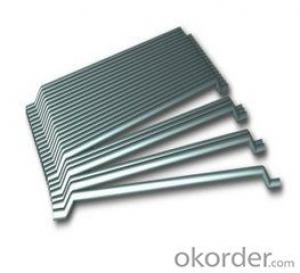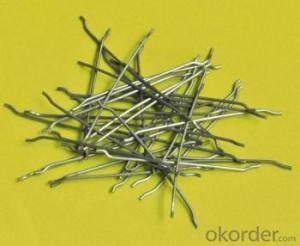Melt Extract Stainless Steel Fiber - China Supplier Concrete Steel Fiber from CNBM
- Loading Port:
- Tianjin
- Payment Terms:
- TT OR LC
- Min Order Qty:
- 1 m.t.
- Supply Capability:
- 600 m.t./month
OKorder Service Pledge
Quality Product, Order Online Tracking, Timely Delivery
OKorder Financial Service
Credit Rating, Credit Services, Credit Purchasing
You Might Also Like
Quick Details
Place of Origin: Tianjin, China (Mainland)
Model Number: 0.55
Material: Steel
Production Process: Cold drawn
Fiber Lengh: 35
Type: 1
Compressive Strength: >1200MPa
Aspect ratio: 63
Standard: ASTM A820M-11
Section Shape: Circular
Application: Concrete Reinforcement
Product Application: Industrial Floor
Packaging & Delivery
| Packaging Details: | 20 kg/Bag,50 bags/Pallet or 1,000kg/ Bulk Bag |
|---|---|
| Delivery Detail: | 1 Month |
Product Description
| Diameter | 0.55 mm (0.217 in) | ||
| Length | 35 mm (13.780 in) | ||
| Aspect Ratio | 63 | ||
| Tensile strength | 1200 MPa | ||
| Type | Cold drawn Steel Fiber | ||
| End | Hooked-end Steel Fiber | ||
| Glued/Loose | Glued Steel Fiber | ||
| Bending Angle | 45°(min.30°) | ||
| Usage & Performance | Floor:Trafficked areas and Industrial floors | ||
| Shotcrete :Slope stabilization and Final lining | |||
| Precast concrete:Pipe and Railway sleepers | |||
| Packing | Standard Export Pallet Packing | Bag Packing | 20 kg/Bag,50 bags/Pallet |
| Bulk Packing | 1,000kg/ Bulk Bag | ||
| Loading Quantity | 20’GP | 20-25 Tonne/Tonnes | |
| 40’GP | 25-27 Tonne/Tonnes | ||
| 40’HQ | 25-27 Tonne/Tonnes | ||
| MOQ | 1 kg for trial order | ||
| Supply Ability | 10,000 Tonne/Tonnes per Year | ||
| Payment Terms | T/T or L/C at sight | ||
| Delivery Time | Within 15 days after receiving deposit or original L/C at sight | ||
| Certification | ISO9001:2000, CE, | ||
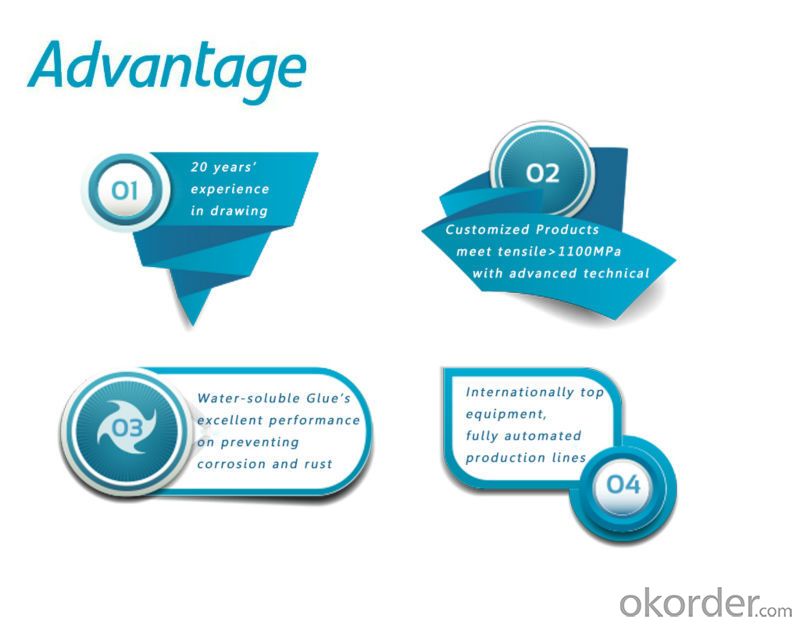
| Product | Diameter | Length mm/in | Aspect Ratio | Type | Packing |
| G-6030 | 0.5 mm (0.197 in) | 30 mm (11.811 in) | 60 | Glued | 20 kg/Bag, or 1,000kg/ Bulk Bag |
| G-6535 | 0.55 mm (0.217 in) | 35 mm (13.780 in) | 65 | Glued | 20 kg/Bag, or 1,000kg/ Bulk Bag |
| G-6035 | 0.6 mm (0.236 in) | 35 mm (13.780 in) | 60 | Glued | 20 kg/Bag, or 1,000kg/ Bulk Bag |
| G-8060 | 0.75 mm (0.295 in) | 60 mm (23.622 in) | 80 | Glued | 20 kg/Bag, 50 bags/Pallet |
| G-6060 | 0.9 mm (0.354 in) | 60 mm (23.622 in) | 60 | Glued | 20 kg/Bag, 50 bags/Pallet |
| G-6030 | 0.5 mm (0.197 in) | 30 mm (11.811 in) | 60 | Loose | 20 kg/Bag, or 1,000kg/ Bulk Bag |
| G-6535 | 0.55 mm (0.217 in) | 35 mm (13.780 in) | 65 | Loose | 20 kg/Bag, or 1,000kg/ Bulk Bag |
| G-6035 | 0.6 mm (0.236 in) | 35 mm (13.780 in) | 60 | Loose | 20 kg/Bag, or 1,000kg/ Bulk Bag |
| G-8060 | 0.75 mm (0.295 in) | 60 mm (23.622 in) | 80 | Loose | 20 kg/Bag, 50 bags/Pallet |
| G-6060 | 0.9 mm (0.354 in) | 60 mm (23.622 in) | 60 | Loose | 20 kg/Bag, 50 bags/Pallet |
- Q: Can melt extract stainless steel fiber be used in retaining wall construction?
- Retaining wall construction can indeed benefit from the utilization of melt extract stainless steel fiber. These fibers possess remarkable durability and outstanding tensile strength, thus rendering them well-suited for reinforcing concrete structures like retaining walls. Conventionally, the stainless steel fibers are incorporated into the concrete mixture during the mixing process, thereby providing reinforcement across the entire structure. This aids in bolstering the overall strength and durability of the retaining wall, thereby enhancing its resistance to cracking and shifting. Furthermore, the corrosion resistance of stainless steel fibers guarantees the continued structural integrity of the retaining wall, even in harsh environmental conditions. In summary, the implementation of melt extract stainless steel fiber in retaining wall construction is a dependable and efficacious approach to fortifying the structure's strength and durability.
- Q: How does melt extract stainless steel fiber affect the permeability of concrete to water?
- The use of melt extract stainless steel fiber in concrete can significantly affect its permeability to water. Stainless steel fibers are added to concrete mixtures to enhance its durability and improve the overall performance of the structure. When stainless steel fibers are incorporated into concrete, they create a three-dimensional network of reinforcement within the matrix. This network acts as a barrier that restricts the movement of water through the concrete. The fibers create a tortuous path for water molecules, reducing the permeability of the material. The presence of stainless steel fibers also helps to reduce the formation of microcracks in concrete. Microcracks can develop due to various factors such as shrinkage, temperature changes, and external forces. These cracks provide pathways for water to enter the concrete, increasing its permeability. However, the addition of stainless steel fibers helps to control and minimize the formation and propagation of these cracks, which in turn lowers the permeability of the concrete. Moreover, stainless steel fibers provide additional benefits to the concrete matrix by increasing its tensile strength and ductility. This enhanced strength helps the concrete to better withstand external loads and stresses, reducing the likelihood of crack formation and water penetration. In summary, the incorporation of melt extract stainless steel fiber in concrete positively affects its permeability to water. The fibers create a barrier that restricts the movement of water molecules and help to control the formation of microcracks, thereby reducing the permeability of the concrete.
- Q: Does melt extract stainless steel fiber improve the ductility of concrete?
- Yes, melt extract stainless steel fiber can improve the ductility of concrete. Stainless steel fibers, when added to concrete, can enhance its flexural strength and toughness. These fibers act as reinforcement within the concrete matrix, creating a network that helps to distribute stress and prevent crack propagation. This reinforcement increases the ability of concrete to deform and absorb energy before failure, thus improving its ductility. Additionally, stainless steel fibers have high tensile strength and corrosion resistance, which further contribute to the improved ductility of concrete.
- Q: What is the effect of melt extract stainless steel fiber on the bond strength of concrete?
- The bond strength of concrete is greatly affected by the inclusion of melt extract stainless steel fiber. By adding these fibers to concrete mixtures, the bond between the concrete and other materials is strengthened, ultimately enhancing the overall strength and durability of the structure. Stainless steel fibers function as reinforcement within the concrete matrix, thereby increasing its tensile strength and preventing the propagation of cracks. These fibers form a three-dimensional network that aids in distributing the load and improving the bond between the concrete and other components, such as aggregates or reinforcement bars. The exceptional properties of melt extract stainless steel fibers, including their remarkable tensile strength, corrosion resistance, and ductility, make them an ideal choice for enhancing the bond strength of concrete. These fibers effectively bridge any gaps or weak areas in the concrete, preventing further deterioration and enhancing the structural integrity as a whole. In addition to improving bond strength, stainless steel fibers also enhance the concrete's resistance to impact, fatigue, and thermal stresses. This makes them particularly suitable for applications that require high-performance concrete, such as industrial floors, tunnels, bridges, and pavements. Furthermore, the inclusion of stainless steel fibers can also improve the concrete's resistance to shrinkage and plastic cracking, thereby reducing the need for control joints and minimizing maintenance requirements. Overall, the incorporation of melt extract stainless steel fiber in concrete mixtures brings about a significant improvement in the bond strength of the material, resulting in a more durable and reliable concrete structure that exhibits enhanced resistance to cracking, impact, and other external forces.
- Q: What is the effect of melt extract stainless steel fiber on the modulus of resilience of concrete?
- The use of melt extract stainless steel fiber in concrete increases the modulus of resilience. This means that the concrete becomes more resistant to cracking and has improved energy absorption capabilities.
- Q: Can melt extract stainless steel fiber be used in highway pavements?
- Highway pavements can benefit from the use of melt extract stainless steel fiber. These fibers are renowned for their robustness and endurance, making them ideal for enduring heavy traffic and harsh environmental conditions. When incorporated into concrete or asphalt mixtures, stainless steel fibers enhance the overall performance of the pavement by bolstering its crack resistance, flexural strength, and fatigue resistance. This, in turn, prolongs the lifespan of the pavement and reduces the need for frequent repairs and maintenance. Furthermore, the corrosion-resistant qualities of stainless steel fibers ensure that the highway pavement remains structurally sound and intact as time passes. Therefore, incorporating melt extract stainless steel fiber into highway pavements is a viable solution for augmenting their durability and longevity.
- Q: Does melt extract stainless steel fiber affect the workability of concrete?
- Indeed, the inclusion of melt extract stainless steel fiber in concrete can have an impact on its workability. Incorporating these stainless steel fibers into the concrete mixture can augment its viscosity and rigidity, thereby complicating the process of manipulation. Consequently, the workability of the concrete may be compromised, rendering it less fluid and more challenging to shape or mold. Nonetheless, the severity of this influence hinges upon the quantity and length of the stainless steel fibers employed, as well as the specific necessities of the concrete application.
- Q: What is the effect of melt extract stainless steel fiber on the post-cracking behavior of concrete?
- The addition of melt extract stainless steel fibers to concrete can significantly improve its post-cracking behavior. These fibers act as reinforcement, enhancing the ductility and toughness of the concrete. They help to distribute the stresses more evenly throughout the material, reducing the initiation and propagation of cracks. This ultimately leads to improved crack control and increased resistance to cracking under various loading conditions.
- Q: Can melt extract stainless steel fiber improve the resistance of concrete to sulfate attack?
- Yes, melt extract stainless steel fiber can improve the resistance of concrete to sulfate attack. Stainless steel fibers have high corrosion resistance and can enhance the durability and strength of concrete by reducing cracking and improving its resistance to chemical attacks such as sulfate attack.
- Q: Can melt extract stainless steel fiber be used in the construction of offshore platforms?
- Yes, melt extract stainless steel fiber can be used in the construction of offshore platforms. Melt extract stainless steel fiber is a high-strength material that offers excellent corrosion resistance, making it suitable for use in marine environments such as offshore platforms. It can be used in concrete reinforcement to enhance the structural integrity and durability of the platform. The stainless steel fiber's ability to withstand harsh conditions, including exposure to saltwater, ensures that the offshore platform remains robust and long-lasting. Additionally, the use of stainless steel fiber can also help in reducing the maintenance and repair costs associated with corrosion damage, making it an ideal choice for offshore platform construction.
Send your message to us
Melt Extract Stainless Steel Fiber - China Supplier Concrete Steel Fiber from CNBM
- Loading Port:
- Tianjin
- Payment Terms:
- TT OR LC
- Min Order Qty:
- 1 m.t.
- Supply Capability:
- 600 m.t./month
OKorder Service Pledge
Quality Product, Order Online Tracking, Timely Delivery
OKorder Financial Service
Credit Rating, Credit Services, Credit Purchasing
Similar products
Hot products
Hot Searches
Related keywords
